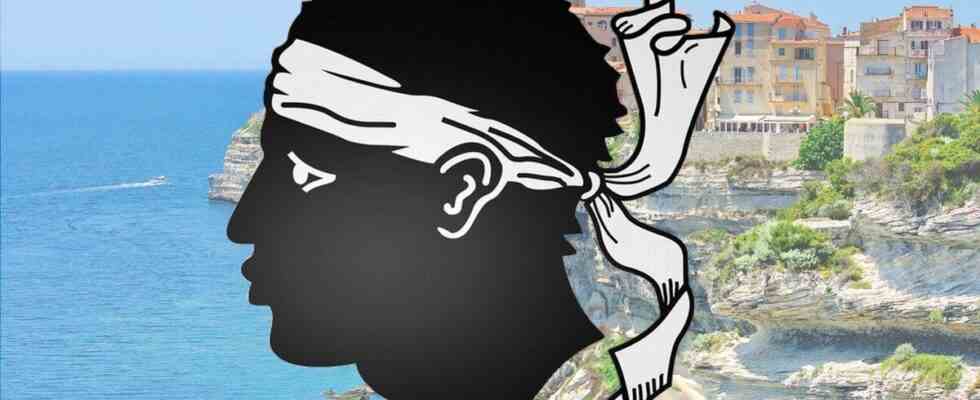Was a twenty-sixth Corsican band stuck with organized crime recently added to the “confidential-evolving” document drawn up by the police on March 18? In a press release sent Tuesday to Corse-Morning, the GCC, for “Ghjuventu Clandestina Corsa” (Corsican Clandestine Youth), has formalized its existence. An existence observed since last summer, with the multiplication of arson attacks mainly targeting second homes.
On Tuesday, moreover, the National Anti-Terrorist Prosecutor’s Office (Pnat) took up “the entire GCC file”, i.e. 14 cases of degradation by fire in which the tag “GCC” appeared, indicated the prosecutor of Ajaccio, Nicolas Septe.
The announcement of “Ghjuventu Clandestina Corsa” was made the very evening of Interior Minister Gérald Darmanin’s visit to Corsica, where the GCC claims to now want to be “the armed wing of a revolutionary movement” and to march ” in the footsteps of the FLNC”. A Corsican National Liberation Front from the beginnings well known to Léo Battisti, one of the founding nationalist militants of the historic clandestine organization. Today leader of the Maffia Nó collective which he co-founded in September 2019, he intends not to give too much importance to this “GCC”: “It is the fact of a few young people driven by an ideal but finding themselves out of phase with the reality of Corsica. »
No “amalgam”, therefore, to do with the criminal organizations against which the fight is the priority. This while the current “Corsican reality” is, according to him as for the political majority of the executive assembly led by Gilles Siméoni, that of the “outstretched hand” of the State.
“Anything that generates chaos favors the mafia”
Nevertheless, a GCC coming to swell the ranks of the 25 criminal gangs that are already rampant on the island is likely to add to the disturbances already caused by “mafia lobbying” in the establishment of the political process of autonomy. “Anything that generates chaos favors the mafia”, believes Léo Battesti. The man who called in 1992 for the self-dissolution of an FLNC plagued by internal struggles recalls that the Brise de Mer gang, one of the most powerful criminal organizations on the island, “was able to develop for twenty years because the forces of repression were focused on the FLNC”. “And as long as the mafias are there, we will not be able to move on to autonomy,” says Léo Battesti again.
In Corsica, the mafias have spread into a number of economic activity sectors, including legal ones. After narcotics, extortion and gambling circles, the shadow of these criminal groups now hangs over construction, waste management, tenders and… football. Proof of this is this week with the trial of two former leaders of Gazelec Ajaccio.
Towards an Italian Penal Code?
In an attempt to find solutions against this grip and to organize to move forward on the path to autonomy, the executive assembly of Corsica has launched five commissions to fight against mafia phenomena. Members of the anti-mafia collectives Maffia Nó and Massimu Susini – named after this young man murdered in Cargèse in 2019 – will participate. “We are breaking the omerta, believes Léo Battesti. The idea is to be able to bring forward proposals and in particular to manage to change the Penal Code which must adapt to this crime. “An adaptation that would take the example of Italian legislation, one of the most advanced and repressive in Europe in the fight against the mafias.
For their part, in addition to having “filed” each of the criminal gangs, retracing their history, their favorite sectors of activity and their bonds of friendship or rivalry, the judicial police opened an email address in 2019 to collect the testimonies of people or entrepreneurs who are victims of extortion or racketeering, whether in Corsica, or near Aix-en-Provence and Marseille. There, where some of these criminal gangs also deploy their influences.
On the importance of Charles Pieri
The fact remains that the process towards autonomy also finds itself dealing with the new political deal that emerged from the polls following the regional elections of 2021. These saw the end of the alliance between nationalists and separatists on the one hand and separatists on the other who had allowed Gilles Siméoni to come to power in 2015.
If the end of this alliance seems to simplify things in the executive assembly, on the Corsican field, it tends rather the relations. Especially since the arrests made in the nationalist milieu and the imprisonment of Charles Pieri in December, which may also have had the effect of blowing on the nationalist embers.
The “difficult to quantify” influence of the former head of the FLNC “seems to represent a brake in the negotiations between the State and the community of Corsica”, already noted in March 2022 the police information in this famous document devoted to the “25 criminal teams”, to which 20 minutes had access. And that was counting without the GCC which, in its press release, demanded on Tuesday the release of this major actor of the Corsica Libera party.

